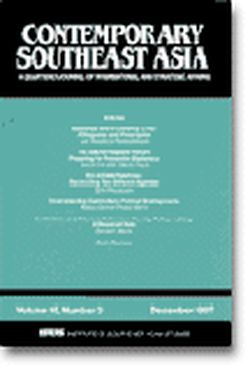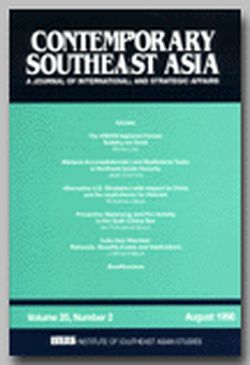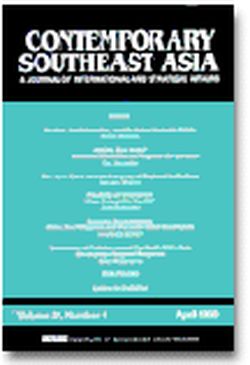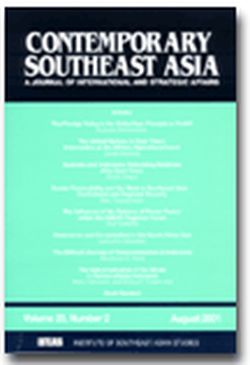Contemporary Southeast Asia: A Journal of International and Strategic Affairs Vol. 19/3 (Dec 1997)

Date of publication:
December 1997
Number of pages:
128
Code:
CS19/3
Contents
-
Preliminary Pages
-
Southeast Asia's Currency Crisis: A Diagnosis and Prescription, by Leif Rosenberger, contributor see abstractThe currency crisis in Southeast Asia in 1997 primarily reflects homegrown shorthcomings in the national economic strategies of Thailand, Malaysia and Indonesia. While international factors (such as the devaluations of the Japanese and Chinese currencies and NAFTA) all contributed to large and destabilizing current account deficits, crony capitalism and an economic model that favoured runaway economic growth over financial turmoil. So far, the policy response of the "Asian tigers" has been piecemeal and inadequate. Until this policy paralysis changes, investors will remain jittery about the region and financial turbulence will frustrate economic recovery and political stability.
-
The ASEAN Regional Forum: Preparing for Preventive Diplomacy, by Simon Tay, Obood Talib, contributors see abstractThe article considers how the ASEAN Regional Forum (ARF) should be prepared to exercise preventive diplomacy in order to maintain peace in the region, and the implications of such preparations for the evolution of the ARF as an institution. The key concepts and practices in prevetive diplomacy are outlined to suggest how these match or clash with the norms of the ARF and the "ASEAN way". Will preventive diplomacy transgress the norm of non-interference? Does it require the development of greater and more autonomous institutions? The article suggests three key preparations the ARF must make for the practice of preventive diplomacy and reviews different proposals and possibilities for both norms and institutions.
-
EU-Asean Relations: Reconciling Two Different Agendas, by Eero Palmujoki, contributor see abstractThis article discusses the role of politico-cultural agendas in the EU-ASEAN dialogue. Its underlying theme is that each regional system is trying to develop its own politico-ideological culture. Despite the different models of organization and the different paths to development, political agendas have an important role both in ASEAN's external policy and in the European Union's common foreign policy. The EU's commitment to "the European common values" in the Maastricht Treaty and its implications for the EU's dialogue with ASEAN is balanced by politico-economic considerations. Similarly, the central concepts underlying ASEAN's external relations, particularly sovereignty and ASEAN unity, is counterweighed by the important notion of interdependence.
-
Understanding Cambodia's Political Developments, by Abdulgaffar Peang-Meth, contributor see abstractAs if an illustration of the time-worn maxim that those who do not learn from history are condemned to repeat it, the Cambodian history wheel seems poised to begin anew the cycle of destruction and despair that has become familiar in recent decades. Neither the world community nor Cambodians themselves seem able to profit from the lessons of the past. Judging by their behaviour in recent international events, nations that once could be relied upon to uphold principles of civil and human rights than risk conflict. Order and stability seem more highly prized values tahn the democratic priniciples that once drove much of international interaction.
-
Institutions and Actors in Vietnamese Foreign Policy-making: A Research Note, by Zachary Abuza, contributor see abstractSince the 1986 implementation of Vietnam's economic reform programme, doi moi, Vietnam's foreign policy-making process has been decentralized. As Vietnam's security was threatened throughout its post-colonial history, foreign policy was monopolized at the highest echelons of power. Although the Vietnam Communist Party remains at the apex of all policy-making, leadership transitions, a peaceful international environment, the need for consensus building, the separation of Party and State functions, the rise of technocrats , and the need for expert advice, have all contributed to the broadening of Vietnamese foreign policy-making.
- BOOK REVIEWS
-
BOOK REVIEW: Southeast Asia: Tradition and Modernity in the Contemporary World, edited by Donald G. McCloud, by Gerald Jordan, contributor
-
BOOK REVIEW: Pathways to Asia: The Politics of Engagement, edited by Richard Robison, by Peter Polomka, contributor
-
BOOK REVIEW: Divided Kashmir: Old Problems, New Opportunities for India, Pakistan, and the Kashmiri People, edited by Mushtaqur Rahman
-
BOOK REVIEW: Southeast Asian Security in the New Millennium, edited by Richard J. Ellings and Sheldon W. Simon, by Mark G Rolls, contributor





